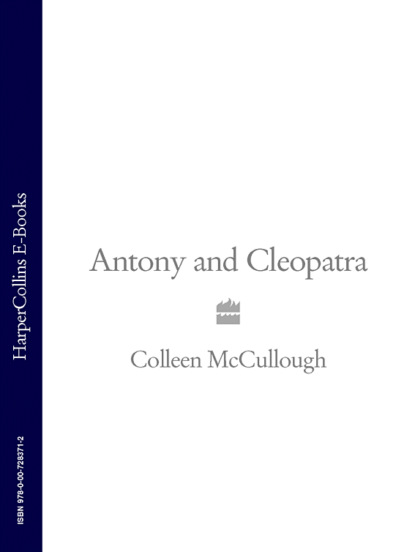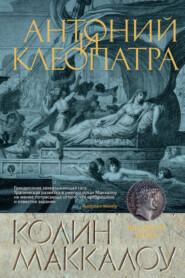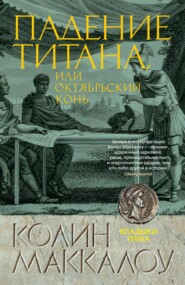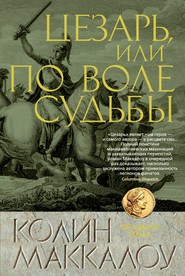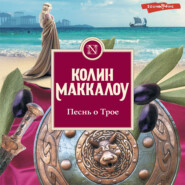По всем вопросам обращайтесь на: info@litportal.ru
(©) 2003-2024.
✖
Antony and Cleopatra
Автор
Год написания книги
2019
Настройки чтения
Размер шрифта
Высота строк
Поля
‘My very dear Antonius,’ it said, ‘it grieves me sorely to have to pass on the news I have just received from Further Spain. Your brother Lucius died in Corduba not very long into his tenure as governor. From all the many reports I have read of the matter, he simply dropped dead. No lingering, no pain. The physicians say it was a catastrophe originating in the brain, which autopsy revealed was full of blood around its stem. He was cremated in Corduba, and the ashes were sent to me along with documentation sufficient to satisfy me on all counts. I hold his ashes and the reports against your coming. Please accept my sincere condolences.’ It was sealed with Divus Julius’s sphinx ring.
Of course Antony didn’t believe a word of it beyond the fact that Lucius was dead; within a day he was hurrying to Patrae and orders had gone to western Macedonia to embark two legions from Apollonia immediately. The other eight were put on stand-by for shipment to Brundisium as soon as he summoned them.
Intolerable that Octavian should have the news first! And why had no word come to him ahead of that letter? Antony read the missive as a challenge thrown down: your brother’s ashes are in Rome – come and get them if you dare! Did he dare? By Jupiter Optimus Maximus and all the gods, he dared!
An informative letter from Plancus to Octavian sped off from Patrae, where the enraged Antony was obliged to wait until his two legions were confirmed as sailed. It went (had Antony only known of its contents, it would not have) together with Antony’s curt order to Pollio to get his legions moving down the Via Adriatica; at the moment they were in Fanum Fortunae, where Pollio could move on Rome along the Via Flaminia, or hug the Adriatic coast to Brundisium. A quailing Plancus begged a place on Antony’s ship, judging his chances of slipping through the lines to Octavian easier on Italian soil. By now he was desperately wishing that he hadn’t sent that letter – could he be sure Octavian wouldn’t leak its contents back to Antony?
His guilt made Plancus an edgy, anxious companion on the voyage, so when, in mid-Adriatic, the fleet of Gnaeus Domitius Ahenobarbus hove in sight, Plancus soiled his loincloth and almost fainted.
‘Oh, Antonius, we’re dead men!’ he wailed.
‘At the hands of Ahenobarbus? Never!’ said Antony, nostrils flaring. ‘Plancus, I do believe you shit yourself!’
Plancus fled, leaving Antony to wait for the arrival of a rowboat heading for his ship. His own standard still fluttered from the mast, but Ahenobarbus had lowered his.
Squat, dark and bald, Ahenobarbus clambered neatly up a rope ladder and advanced on Antony, grinning from ear to ear. ‘At last!’ the irascible one cried, hugging Antony. ‘You’re moving on that odious little insect, Octavianus, aren’t you? Please say you are!’
‘I am’ was Antony’s answer. ‘May he choke on his own shit! Plancus just shit himself at sight of you, and I would have put his courage higher than Octavianus’s. Do you know what Octavianus did, Ahenobarbus? He murdered Lucius in Further Spain, then had the gall to write and inform me that he’s the proud owner of Lucius’s ashes! He dares me to collect them! Is he mad?’
‘I’m your man through thick and thin,’ Ahenobarbus said huskily. ‘My fleet is yours.’
‘Good,’ said Antony, extricating himself from a very strong embrace. ‘I may need a big warship with a solid bronze beak to break Brundisium’s harbor chain.’
But not a sixteener with a twenty-talent bronze beak could have broken the chain strung across the harbor mouth; anyway, Ahenobarbus didn’t have a ship half as large as a sixteener. The chain was anchored between two concrete piers reinforced with iron pieces, and each of its bronze links was fashioned from metal six inches thick. Neither Antony nor Ahenobarbus had ever seen a more monstrous barrier, nor a population so jubilant at the sight of their frustrated attempts to snap that barrier. While the women and children cheered and jeered, the men of Brundisium subjected Ahenobarbus’s battle quinquereme to a murderous hail of spears and arrows that finally drove it offshore.
‘I can’t do it!’ Ahenobarbus yelled, weeping in rage. ‘Oh, but when I do, they’re going to suffer! And where did it come from? The old chain was a tenth this one’s size!’
‘That Apulian peasant Agrippa installed this one,’ Plancus was able to say, sure he no longer smelled of shit. ‘When I left to seek refuge with you, Antonius, the Brundisians were quick to explain its genesis. Agrippa has fortified this place better than Ilium was, including on its land sides.’
‘They won’t die quickly,’ Antony snarled. ‘I’ll impale the town magistrates on stakes up their arses and drive them in at the rate of an inch a day.’
‘Ow, ow!’ said Plancus, flinching at the thought. ‘What are we going to do?’
‘Wait for my troops and land them wherever we can to north and south,’ said Antony. ‘Once Pollio arrives – he’s taking his sweet time! – we’ll squash this benighted place from its land side, Agrippa’s fortifications or no. After a siege, I suppose. They know I won’t be kind to them – they’ll resist to the end.’
So Antony withdrew to the island off Brundisium’s harbor mouth, there to wait for Pollio and try to discover what had become of Ventidius, curiously silent.
Sextilis had ended and the Nones of September were gone, though the weather was still hot enough to make island living an ordeal. Antony paced; Plancus watched him pace. Antony growled; Plancus pondered. Antony’s thoughts never left the subject of Lucius Antonius; Plancus’s ranged far and wide on one subject too, but a more fascinating one – Marcus Antonius. For Plancus was seeing new facets in Antony, and didn’t like what he saw. Wonderful, glorious Fulvia wove in and out of his mind – so brave and fierce, so … so interesting. How could Antony have beaten a woman, let alone his wife? The granddaughter of Gaius Gracchus!
He’s like a small child with its mother, Plancus thought, brushing at tears. He should be in the East fighting the Parthians – that’s his duty. Instead, he’s here on Italian soil, as if he hasn’t the courage to abandon it. Is it Octavianus who eats at him, or is it insecurity? At his core, does Antonius believe he can win future laurels? Oh, he’s brave, but generaling armies doesn’t demand bravery. It’s more an intellectual exercise, an art, a talent. Divus Julius was a genius at it, Antonius is Divus Julius’s cousin. But, to Antonius, I suspect that fact is more a burden than a delight. He’s so terrified of failing that, like Pompeius Magnus, he won’t move unless he has superior numbers. Which he has here in Italia, between Pollio, Ventidius and his own legions just across a small sea. Sufficient to crush Octavianus, even now Octavianus has Calenus’s eleven from Further Gaul. I gather that they’re still in Further Gaul under the command of Salvidienus, writing to Antonius regularly in an attempt to switch sides. One little item I didn’t tell Octavianus.
What Antonius fears in Octavianus is that genius Divus Julius had in such abundance. Oh, not as a general of armies! As a man of infinite courage, the kind of courage Antonius is beginning to lose. Yes, his fear of failure grows, whereas Octavianus starts to dare all, to gamble on unpredictable outcomes. Antonius is at a disadvantage when dealing with Octavianus, but even more so when dealing with foes as foreign as the Parthians. Will he ever wage that particular war? He rants about lack of money, but is that lack really the sum total of his reluctance to fight the war he should be fighting? If he doesn’t fight it, he’ll lose the confidence of Rome and Romans; he knows that too. So Octavianus is his excuse for lingering in the West. If he drives Octavianus out of the arena, he’ll have so many legions that he could defeat a quarter of a million men. Yet, with sixty thousand men, Divus Julius defeated over three hundred thousand. Because he went about it with genius. Antonius wants to be master of the world and the First Man in Rome, but can’t work out how to go about it.
Pace, pace, pace, up and down, up and down. He’s insecure. Decisions loom, and he’s insecure. Nor can he embark upon one of his famous fits of ‘inimitable living’ – what a joke, to call his cronies in Alexandria the ‘Society of Inimitable Livers’! Now here he is, in a situation where he can’t binge his way to forgetfulness. Haven’t his colleagues realized, as I have, that Antonius debauched is simply demonstrating his innate weakness?
Yes, concluded Plancus, it is time to change sides. But can I do that at the moment? I doubt it, in the same way as I doubt Antonius. Like him, I’m short on steel.
* * *
Octavian knew all this with more conviction than Plancus, yet he couldn’t be sure which way the dice would fall now Antony had arrived outside Brundisium; he had staked everything on the legionaries. Then their representatives came to tell him they would not fight Antony’s troops, be they his own, or Pollio’s, or Ventidius’s. An announcement that saw Octavian limp with relief. It only remained to see if Antony’s troops would fight for him.
Two nundinae later, he had his answer. The soldiers under the command of Pollio and Ventidius had refused to fight their brothers at arms.
He sat down to write Antony a letter.
My dear Antonius, we are at an impasse. My legionaries refuse to fight yours, and yours refuse to fight mine. They belong to Rome, they say, not to any one man, even a Triumvir. The days of massive bonuses, they say, are past. I agree with them. Since Philippi I have known that we can no longer sort out our differences by going to war against each other. Imperium maius we may have but, in order to enforce that, we must have command of willing soldiers. We do not.
I therefore propose, Marcus Antonius, that each of us chooses a single man as his representative to try to find a solution to this impasse. As a neutral participant whom both of us deem fair and impartial, may I nominate Lucius Cocceius Nerva? You are at liberty to dispute my choice and nominate a different man. My delegate will be Gaius Maecenas. Neither you nor I should be present at this meeting. To attend it would mean ruffled tempers.
‘The cunning rat!’ cried Antony, screwing up the letter.
Plancus picked it up, smoothed it out and read it. ‘Marcus, it’s the logical solution to your predicament,’ he faltered. ‘Consider for a moment, please, where you are and what you face. What Octavianus suggests may prove a salve to heal injured feelings on both sides. Truly, it is your best alternative.’
A verdict echoed by Gnaeus Asinius Pollio several hours later when he arrived by pinnace from Barium.
‘My men won’t fight, nor will yours,’ he said flatly. ‘I for one can’t change their minds, nor will yours change theirs; and from all reports Octavianus is in like straits. The legions have decided for us, so it’s up to us to find an honorable way out. I have told my men that I will arrange a truce. Ventidius has done the same. Give in, Marcus, give in! It’s not a defeat.’
‘Anything that enables Octavianus to wriggle out of the jaws of death is a defeat,’ Antony said stubbornly.
‘Nonsense! His troops are as disaffected as ours.’
‘He’s not even game to confront me! It’s all to be done by agents like Maecenas – ruffled tempers? I’ll give him ruffled tempers! And I don’t care what he says, I’m going to his little meeting to represent myself!’
‘He won’t be present, Antonius,’ Pollio said, eyes fixed on Plancus, rolling his eyes skyward. ‘I have a far better scheme. Agree to it, and I’ll go as your representative.’
‘You?’ Antony asked incredulously. ‘You?’
‘Yes, I! Antonius, I’ve been consul for eight-and-a-half months, yet I haven’t been able to go to Rome to don my consular regalia,’ Pollio said, exasperated. ‘As consul, I outrank Gaius Maecenas and a paltry Nerva combined! Do you really think I’d let a weasel like Maecenas dupe me? Do you?’
‘I suppose not,’ Antony said, beginning to yield. ‘All right, I’ll agree to it. With some conditions.’
‘Name them.’
‘That I am free to enter Italia through Brundisium, and that you be permitted to go to Rome to assume your consulship without any impediments put in your way. That I retain my right to recruit troops in Italia. And that the exiles be allowed to go home immediately.’
‘I don’t think any of those conditions will be a problem,’ said Pollio. ‘Sit down and write, Antonius.’
Odd, thought Pollio as he rode down the Via Minucia toward Brundisium, that I always manage to be where the great decisions are made. I was with Caesar – Divus Julius, indeed! – when he crossed the Rubicon, and on that river isle in Italian Gaul when Antonius, Octavianus and Lepidus agreed to divide up the world. Now I’ll be presiding over the next momentous occasion – Maecenas is not a fool, he won’t object to my assuming the chair. What extraordinary luck for a writer of modern history!
Though his family had not been prominent until his advent, Pollio owned an intellect formidable enough to have made him one of Caesar’s favorites. A good soldier and a better commander, he had advanced with Caesar after Caesar became Dictator, and never had had any doubt where his loyalties lay until after Caesar was murdered. Too pragmatic and unromantic to side with Caesar’s heir, he had only one man left to whom to hew – Marcus Antonius. Like many of his peers, he found the eighteen-year-old Gaius Octavius farcical, couldn’t begin to fathom what a peerless man like Caesar could see in such a pretty boy. He believed too that Caesar hadn’t expected to die so soon – he was as tough as an old army boot – and that Octavius had been a temporary heir, just a ploy to exclude Antony until he could judge whether Antony would settle down. Also to see what time would make of the mama’s boy who now denied his mama’s existence. Then Fate and Fortuna had exacted the ultimate penalty from Caesar, allowed a group of embittered, jealous, short-sighted men to murder him. How Pollio rued that, despite his ability to chronicle contemporary events with detachment and impartiality. The trouble was that at the time Pollio had no idea what Caesar Octavianus would make of his unexpected rise to prominence. How could any man foresee the steel and gall inside an inexperienced youth? Caesar, he had long realized, was the only one who had seen what Gaius Octavius was made of. But, even when Pollio had come to understand what lay within Octavian, it was already too late for a man of honor to follow him. Antonius was not the better man, he was simply the alternative pride permitted. Despite his failings – and they were many – at least Antony was a man.
As little as he knew Octavian did Pollio know his principal ambassador, Gaius Maecenas. In all physical respects Pollio was a medium man: height, size, coloring, facial appeal. Like most such, particularly when high intelligence was a part of the package, he mistrusted those who were definitely not medium men in any respect. Had Octavianus not been so vain (boots with three-inch soles, for pity’s sake!) and pretty, he would have fared better in Pollio’s estimation right after Caesar’s assassination. And so it was with Maecenas, plump and plain of face, pop-eyed, rich and spoiled. Maecenas simpered, steepled his fingers, pursed up his lips, looked amused when there was nothing to be amused about. A poseur. Detestable or annoying characteristics. Yet he had volunteered to treat with this poseur because he knew that once Antony simmered down, he would choose Quintus Dellius as his delegate. That could not be allowed to happen; Dellius was too venal and hungry for such delicate negotiations. It was possible that Maecenas was equally venal and hungry but, as far as Pollio could see, Octavianus hadn’t made many mistakes when he selected his inner circle. Salvidienus was a mistake, but his days were numbered. Greed always antagonized Antony, who would feel no compunction at striking him down as soon as his usefulness was at an end. But Maecenas had made no overtures, and he did own one quality Pollio admired: he loved literature and was the enthusiastic patron of several promising poets, including Horace and Virgil, the best versifiers since Catullus. Only that inspired any hope in Pollio that a conclusion satisfying both parties could be reached. But how was he, a plain soldier, going to survive the kind of food and drink a connoisseur like Maecenas was bound to provide?
‘I hope you don’t mind ordinary food and well-watered wine?’ Maecenas asked Pollio the moment he arrived at the surprisingly modest house on Brundisium’s outskirts.
‘Thank you, I prefer it,’ Pollio said.
‘No, thank you, Pollio. May I say before we get down to our real business that I enjoy your prose? I don’t tell you that in a spirit of sycophancy, because I doubt you’re susceptible to the fine art of sucking up; I tell you because it’s the truth.’





